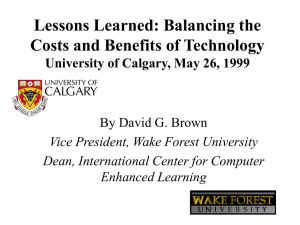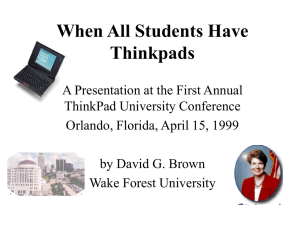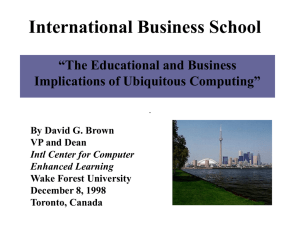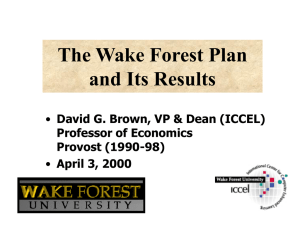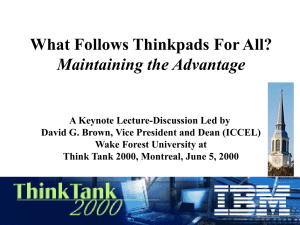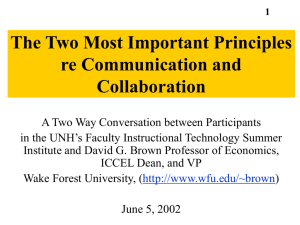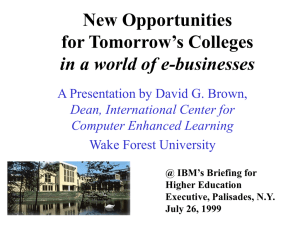Interactive Learning That’s Customized
advertisement
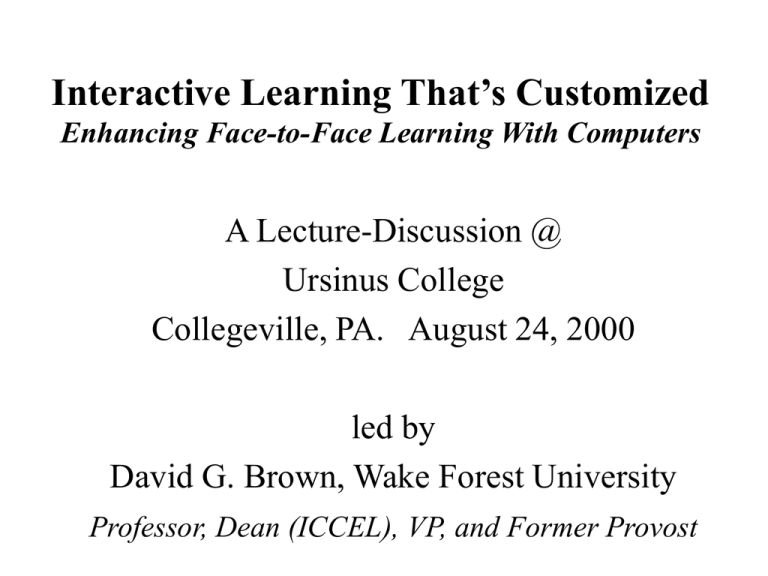
Interactive Learning That’s Customized Enhancing Face-to-Face Learning With Computers A Lecture-Discussion @ Ursinus College Collegeville, PA. August 24, 2000 led by David G. Brown, Wake Forest University Professor, Dean (ICCEL), VP, and Former Provost Major Points • Congratulations-You’re doing it the right way! • Celebrate Culture Change-It’s coming, so relax! • KISS-First go for the low hanging fruit! • Boost Teaching-with or without technology The Ursinus Laptop Advantage •Communications: a wired campus where communication is possible virtually any time and in any place. •Community: an ethical environment where students share values, challenge ideas and arrive at collective community principles. •Computer Competence: a functional environment where high-level e-skills are the standard for all faculty and graduates. •Equal Access to Computing for All: a college of shared and equal means where, regardless of financial need, no one is left behind. •Teaching & Learning Innovation: an intellectually charged environment where cutting-edge resources excite faculty and students with the newest and best educational technologies. Source: Ursinus College, Web Site, August 21, 2000 Applause to Ursinus College for your decision to move toward a situation where-- Teaching proceeds on the assumption that your students have appropriate access to the textbooks, libraries, laboratories, and the Internet! How the Laptop Program Has Changed Wake Forest THE WAKE FOREST PLAN F96: IBM 365XD, 16RAM, 100Mhz, 810MB, CD-ROM, 14.4 modem F97: IBM 380D, 32 RAM, 130Mhz, 1.35GB, CD-ROM, 33.6 modem F98: IBM 380XD, 64 RAM, 233 Mhz, 4.1GB, CD-ROM, 56 modem F99: IBM 390, 128 RAM, 333 Mhz, 6GB, CD-ROM, 56 modem F00: IBM A20m, 500 Mhz, 11GB, 15”ActMatrix, CD-ROM, 90 modem • • • • • • • • • Thinkpads for all New Every 2 Years Own @ Graduation Printers for all Wire Everything Standard Software Full Admin Systems IGN for Faculty Keep Old Computers • • • • • • • • • 40+30 New People 75% Faculty Trained 85% CEI Users 99% E-Mail +15% Tuition ~$1500/Yr/Student 4 Year Phase In Pilot Year Order at--Plan for 2000 http://iccel.wfu.edu ICCEL -- Wake Forest University, 2000 Consequences for Wake Forest • • • • +SAT Scores & Class Ranks +Retention & Grad Rates +Satisfaction & Learning +Faculty Recruitment What’s Being Done? “The Economists’ Way of Thinking” A Course Required of All Freshmen For 15 Students ICCEL -- Wake Forest University, 2000 COURSE OBJECTIVES • To understand a liberal arts education as an opportunity to study with professors who think by their own set of concepts • To learn how to apply economic concepts • To learn how to work collaboratively • To learn computer skills • To improve writing and Learning is enhanced by-• • • • • • • Collaboration among Learners Frequent student/faculty dialogue Prompt Feedback Application of Theory Student Self Initiatives Trustful relations Personal & Individual Teaching Brown’s First Year Seminar • Before Class – Students Find URLs & Identify Criteria – Interactive exercises – Lecture Notes – E-mail dialogue – Cybershows • During Class – – – – One Minute Quiz Computer Tip Talk Class Polls Team Projects • After Class – – – – Edit Drafts by Team Guest Editors Hyperlinks & Pictures Access Previous Papers • Other – – – – – Daily Announcements Team Web Page Personal Web Pages Exams include Computer Materials Forever ICCEL -- Wake Forest University, 1999 Results Compared to Other First Year Courses (Student Response to Brown’s FYS Over 5 Terms) More Same How Much Learned? 2 of 3 1 of 3 How Much Time? 2 of 3 How Much Fun? 3 of 3 Less 1 of 3 Computers Enhance My Teaching and/or Learning Via-Presentations Better--20% More Opportunities to Practice & Analyze--35% More Access to Source Materials via Internet--43% More Communication with Faculty Colleagues, Classmates, and Between Faculty and Students--87% Computers allow people---• to belong to more communities • to be more actively engaged in each community • with more people • over more miles • for more months and years • TO BE MORE COLLABORATIVE ICCEL -- Wake Forest University, 2000 With Ubiquity--The Culture Changes • Mentality shifts-- like from public phone to personal phone. • Teaching Assumptions shift-- like from books in the public library to everyone owns a copy of his/her own. • Timelines shift-- like from “our class meets MWF” to “we see each other all the time and MWF we meet together” • Students’ sense of access shifts-- like from “maybe I can get that book in the library” to “I have that book in my library.” • Relationships shift-- like from a family living in many different states to all family members living in the same town Wake Forest University Http://iccel.wfu.edu ICCEL -- Wake Forest University, 2000 The most important benefits of laptop computing for the entire college community are that the powers of direct inquiry, exploration and dialogue are placed in the hands of teachers and learners at virtually any time and in an place. Ongoing collaboration and communication are especially improved by enhancing the college's excellent facilities and the opportunities for student to faculty interaction. Source: Ursinus Web Site, August 21, 2000 (bolding added) Why Laptop Computers? Chemistry-- Dartmouth, Millsaps, Reed, Wake Forest, Worchester Tech Physics-- Vassar, Arizona, Washington and Lee, Michigan State, , Whitman Business and Economics--- Vanderbilt, Kansas State, Wake Forest, Middlebury Fine Arts-- Tufts, Reed, Connecticut, Williams, East Carolina Writing and Literature--Johns Hopkins, Northwestern, Missouri-Rolla, Language--- MIT, Smith, California-Davis, Texas-Austin, Northwestern Biology and Medicine---Oberlin, Virginia, Johns Hopkins, Texas-Austin, Hendrix International and Politics---Tufts, Oregon Computer Science and Math---Harvard, NYU, American, Washington State 93 Essays 36 Universities 26 Disciplines WHY COMPUTERS? …the faculty answer • • • • • • • Interactive Learning Learn by Doing Collaborative Learning Integration of Theory and Practice Visualization Communication Different Strokes for Different Folks I know my students learn more when I teach with technology! • Technology increases collaboration. More collaboration means more learning • Technology enables different strokes for different folks. More customization means more learning • Technology enables more interaction. More interaction means more learning • The opportunity cost of learning how to use technology is becoming negligible. WHY COMPUTERS? …the institutional answer • • • • • • • Communication! Level Playing Field After College Use Faculty/Students Demand Them Customized/Personalized Digitized Scholarship Competitive Disadvantage Without WHY PORTABLE? Academic Reasons • • • • • Continuous Contact More Collaboration Greater Faculty Availability Greater Sense of Ownership More Flexibility: On site data collection & essay writing. In class use. • Study at best location, not limited to dorm WHY PORTABLE? Administrative Reasons • Stronger Recruitment/Retention • Quick exchange when machine is broken • Fewer Computer Labs: More Space for Other Activities • Built in refresh mechanism • Access to college continues when on vacation, abroad, and after graduation The Faculty Initiative [KISS] Beginning Assumptions • Start by enhancing an existing course, not total redesign! • Use only techniques that can be learned by faculty in less than an hour! • Expect network reliability and access to knowledge help when needed! • Recognize that no experiment can jeopardize the success of a student cohort (Garden Metaphor) I think we’re here because... Our profession has new gardening tools. We want to learn which ones will be useful in stimulating growth in our own gardens. ICCEL -- Wake Forest University, 2000 Metaphors for Professors’ Role • Coach and team • Master and apprentices • Sage on the Stage • Guide by the Side • Fountain of Information • Salesperson ___________________ ICCEL --•Wake Forest University, 2000 The Low Hanging Six Email & Listservs URL addresses (in syllabus) Annotations within word processed documents Powerpoint “lecture outlines” Mini-movies that show successive computer screens Practice quizzing prior-to-class (via WebCT) LESSONS LEARNED • Early investment in extensive multimedia may be more fun than useful • Chat sessions are rarely productive • Threaded discussions work only when the topic is narrowly defined, controversial, and the response is time limited and graded • Powerpoint is often abused and overused Lessons Learned • • • • • • • • • First Focus Upon Communication Undertake achievable goals Contact becomes Continuous. Students expect messages between classes Team assignments increase Papers & Talks often include visuals Departmental clubs thrive Student Portfolios Emerge Students teach faculty ICCEL -- Wake Forest University, 2000 Lessons Learned • Computer challenged students learn basic skills quickly, without special classes • Disciplines use computers differently • The Internet is the place to put electronic class materials (WebCT) • Start with Learning Objectives, Not Technology • If Email is always up, everyone will be happy ICCEL -- Wake Forest University, 2000 Lessons Learned • Greatest benefits are what happens between classes, not during classes. • Greatest gains from computing come from some of the simplest applications • Standardization speeds faculty adoption and eases the pressure upon support staff. • Standardization saves class time. • Student groups are larger and more active. ICCEL -- Wake Forest University, 2000 Main Impact of Computers Upon Learning in College • Student Self Confidence is Shaken When They Aren’t Computer Savvy • Availability of New Methods of Teaching & Learning has greatly increased how much and how we think about effective teaching. • Different strokes for different folks-individualization w/o necessarily personalization • Community is strengthened in every way! [Always in Touch] ICCEL -- Wake Forest University, 2000 David G. Brown Wake Forest University Winston-Salem, N.C. 27109 336-758-4878 email: brown@wfu.edu http//:www.wfu.edu/~brown fax: 336-758-4875
